Mbed OS Device Management example for various ST boards.
DEPRECATED
This example application is not maintained and not recommended. It uses an old version of Mbed OS, Pelion DM and Arm toolchain. It doesn't work with Mbed Studio.
Please use: https://os.mbed.com/teams/mbed-os-examples/code/mbed-os-example-pelion/
This example is known to work great on the following platforms:
- DISCO_L475E_IOT01A - onboard WiFI and onboard QSPI flash. Board specific example using onboard sensors is available here.
- DISCO_F413H - onboard WiFI and onboard QSPI flash.
- DISCO_F469NI - WizFi310 WiFI shield and onboard QSPI flash (see WiFi shield instructions).
- DISCO_F746NG - onboard Ethernet and using onboard QSPI flash.
- DISCO_F769NI - onboard Ethernet and using onboard QSPI flash.
- DISCO_L496AG - WizFi310 WiFI shield and onboard QSPI flash (see WiFi shield instructions).
- NUCLEO_F207ZG - onboard Ethernet and wired SD card (SD card wiring instructions).
- NUCLEO_F412ZG - WizFi310 WiFI shield and SD card shield (see WiFi shield instructions).
- NUCLEO_F429ZI - onboard Ethernet and wired SD card (SD card wiring instructions).
- NUCLEO_F746ZG - onboard Ethernet and wired SD card (SD card wiring instructions).
- NUCLEO_F767ZI - onboard Ethernet and wired SD card (SD card wiring instructions).
- NUCLEO_L476RG - WizFi310 WiFI shield and SD card shield (see WiFi shield instructions).
- NUCLEO_L496ZG - WizFi310 WiFI shield and SD card shield (see WiFi shield instructions).
- NUCLEO_L4R5ZI - WizFi310 WiFI shield and SD card shield (see WiFi shield instructions).
Follow the Quick-Start instructions: https://cloud.mbed.com/quick-start
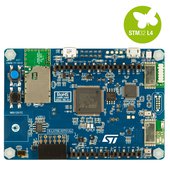
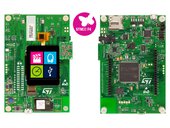

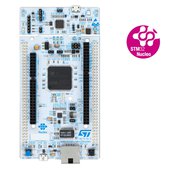
Example functionality
This example showcases the following device functionality:
- Read ADC temperature and ADC vref, and report them as Pelion LWM2M resources (see image below).
- On user button click, increment Pelion LWM2M button resource.
- Allow the user to change the state of the board LED from Pelion LWM2M led_state resource and PUT request.
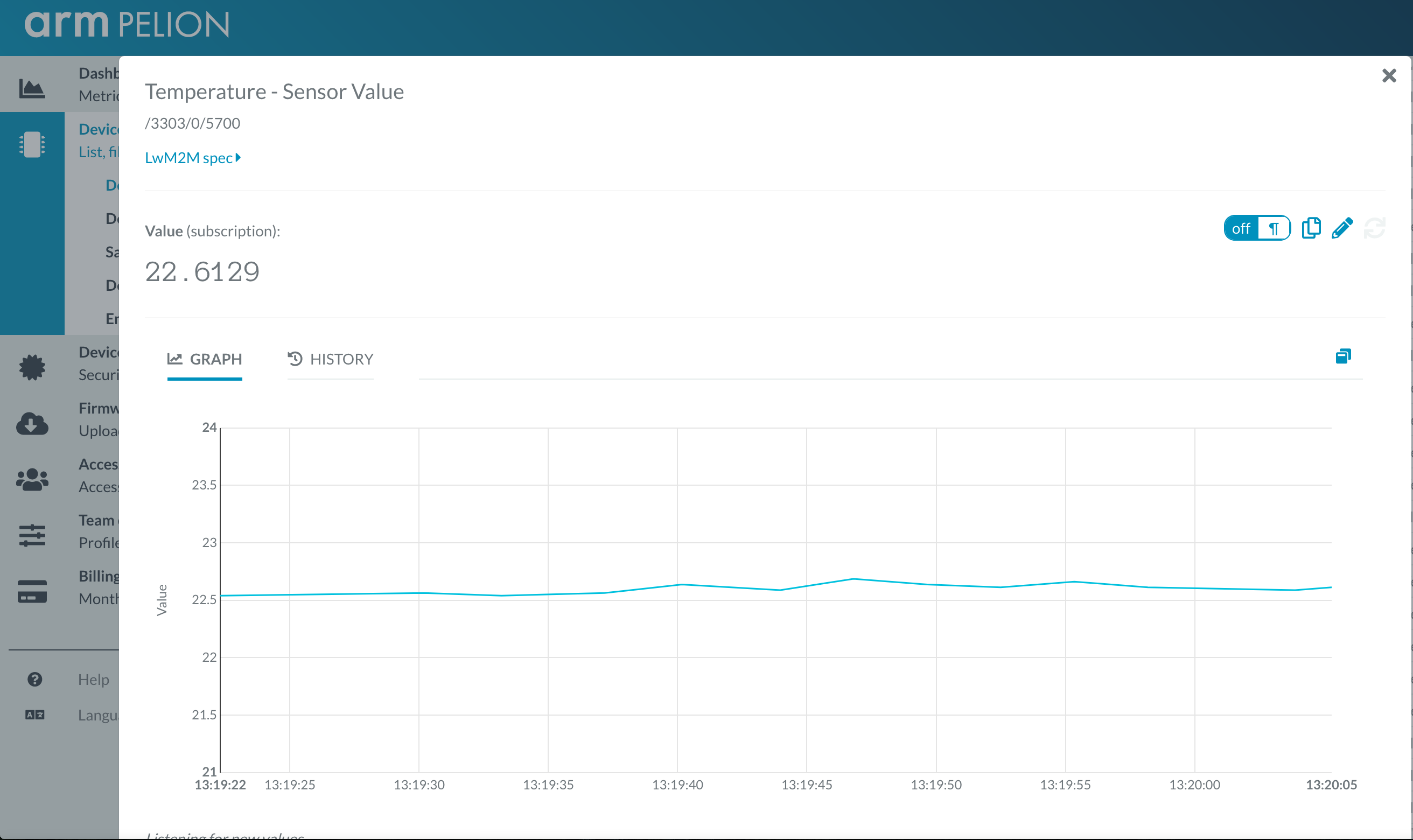
SD card wiring
The ST Nucleo family of boards don't have storage onboard and therefore you will need an SD card. A limitation on ST Nucleo 144 boards is that there's a conflict between Ethernet and SPI pins on Arduino D11. Due to this, the SD card must be wired to different SPI bus that doesn't conflict with other functionality. The image below provide instructions on how to wire an SD card to a non-conflicting SPI instance.
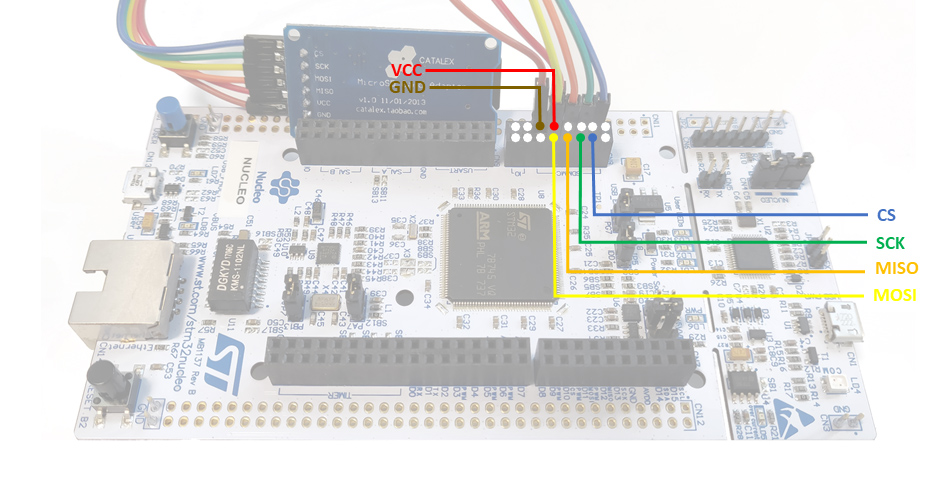
If you are not a first-time Pelion Device Management user your device's SD card may already have connect and update certificates on it. If this is the case, remove and manually format your micro SD card, flash the binary to the device and then re-insert your micro SD card.
WiFi shield setup/wiring
Some ST Nucleo and Discovery boards don't have IP connectivity option, but bundled with a WiFi shield, they can take benefit of full device management capabilities. See links to reference images below on how to wire WizFI310 WiFi shield and/or SD card shield:
- ST DISCO_F469NI + WizFi310 WiFi Shield
- ST DISCO_L496AG + WizFi310 WiFi Shield
- ST NUCLEO_F412ZG + WizFi310 WiFi Shield + SD card shield
- ST NUCLEO_L476RG + WizFi310 WiFi Shield + SD card shield
- ST NUCLEO_L496ZG + WizFi310 WiFi Shield + SD card shield
- ST NUCLEO_L4R5ZI + WizFi310 WiFi Shield + SD card shield
Use this example with Mbed CLI
1. Import the application into your desktop:
mbed import /teams/ST/code/pelion-example-common cd pelion-example-common
2. Install the CLOUD_SDK_API_KEY
mbed config -G CLOUD_SDK_API_KEY <PELION_DM_API_KEY>
For instructions on how to generate your API key, please see the documentation.
3. Initialize firmware credentials (done once per repository). You can use the following command:
mbed dm init -d "<your company name in Pelion DM>" --model-name "<product model identifier>" -q --force
If above command do not work for your Mbed CLI, please consider upgrading Mbed CLI to version 1.8.x or above.
4. Compile and program:
mbed compile -t <toolchain> -m <TARGET_BOARD>
(supported toolchains : GCC_ARM / ARM / IAR)
Revision 25:d8a84856bd96, committed 2019-03-27
- Comitter:
- screamer
- Date:
- Wed Mar 27 18:17:34 2019 +0000
- Parent:
- 24:0c17e53f5b01
- Commit message:
- Improve inline documentation
Changed in this revision
diff -r 0c17e53f5b01 -r d8a84856bd96 .gitignore --- /dev/null Thu Jan 01 00:00:00 1970 +0000 +++ b/.gitignore Wed Mar 27 18:17:34 2019 +0000 @@ -0,0 +1,9 @@ +BUILD/ +*.pyc +.DS_Store +.env +.cache/ +.pytest_cache/ +.update-certificates/ +.manifest_tool.json +.mbed_cloud_config.json
diff -r 0c17e53f5b01 -r d8a84856bd96 .hgignore --- /dev/null Thu Jan 01 00:00:00 1970 +0000 +++ b/.hgignore Wed Mar 27 18:17:34 2019 +0000 @@ -0,0 +1,10 @@ +syntax: glob +BUILD/ +*.pyc +.DS_Store +.env +.cache/ +.pytest_cache/ +.update-certificates/ +.manifest_tool.json +.mbed_cloud_config.json
diff -r 0c17e53f5b01 -r d8a84856bd96 main.cpp
--- a/main.cpp Sun Mar 24 18:02:30 2019 +0000
+++ b/main.cpp Wed Mar 27 18:17:34 2019 +0000
@@ -39,27 +39,38 @@
// Default User button for GET example
InterruptIn button(BUTTON1);
// Default LED to use for PUT/POST example
-DigitalOut led(LED1);
+DigitalOut led(LED1, 0);
+
+// How often to fetch sensor data (in seconds)
+#define SENSORS_POLL_INTERVAL 3.0
+
+// Send all sensor data or just limited (useful for when running out of memory)
+#define SEND_ALL_SENSORS
+
+// Sensors related includes and initialization
// Temperature reading from microcontroller
AnalogIn adc_temp(ADC_TEMP);
// Voltage reference reading from microcontroller
AnalogIn adc_vref(ADC_VREF);
-#define SENSORS_POLL_INTERVAL 1.0
+// Declaring pointers for access to Pelion Device Management Client resources outside of main()
+MbedCloudClientResource *res_button;
+MbedCloudClientResource *res_led;
+MbedCloudClientResource *res_post;
-// Declaring pointers for access to Pelion Device Management Client resources outside of main()
-MbedCloudClientResource *button_res;
-MbedCloudClientResource *led_res;
-MbedCloudClientResource *post_res;
-
-MbedCloudClientResource *temp_res;
-MbedCloudClientResource *volt_res;
-
+// Additional resources for sensor readings
+#ifdef SEND_ALL_SENSORS
+MbedCloudClientResource *res_temperature;
+MbedCloudClientResource *res_voltage;
+#endif /* SEND_ALL_SENSORS */
// An event queue is a very useful structure to debounce information between contexts (e.g. ISR and normal threads)
// This is great because things such as network operations are illegal in ISR, so updating a resource in a button's fall() function is not allowed
EventQueue eventQueue;
+// When the device is registered, this variable will be used to access various useful information, like device ID etc.
+static const ConnectorClientEndpointInfo* endpointInfo;
+
/**
* PUT handler - sets the value of the built-in LED
* @param resource The resource that triggered the callback
@@ -90,8 +101,8 @@
* This function will be triggered either by a physical button press or by a ticker every 5 seconds (see below)
*/
void button_press() {
- int v = button_res->get_value_int() + 1;
- button_res->set_value(v);
+ int v = res_button->get_value_int() + 1;
+ res_button->set_value(v);
printf("Button clicked %d times\n", v);
}
@@ -109,8 +120,6 @@
* @param endpoint Information about the registered endpoint such as the name (so you can find it back in portal)
* When the device is registered, this variable will be used to access various useful information, like device ID etc.
*/
-
-static const ConnectorClientEndpointInfo* endpointInfo;
void registered(const ConnectorClientEndpointInfo *endpoint) {
printf("Registered to Pelion Device Management. Endpoint Name: %s\n", endpoint->internal_endpoint_name.c_str());
endpointInfo = endpoint;
@@ -125,8 +134,8 @@
float vref = adc_vref.read();
printf("ADC temp: %6.4f C, vref: %6.4f %%\r\n", temp, vref);
if (endpointInfo) {
- temp_res->set_value(temp);
- volt_res->set_value(vref);
+ res_temperature->set_value(temp);
+ res_voltage->set_value(vref);
}
}
@@ -138,16 +147,11 @@
if (storage_status != 0) {
printf("Storage mounting failed.\n");
}
-
-#if USE_BUTTON == 1
// If the User button is pressed ons start, then format storage.
bool btn_pressed = (button.read() == MBED_CONF_APP_BUTTON_PRESSED_STATE);
if (btn_pressed) {
printf("User button is pushed on start...\n");
}
-#else
- bool btn_pressed = FALSE;
-#endif /* USE_BUTTON */
if (storage_status || btn_pressed) {
printf("Formatting the storage...\n");
@@ -181,31 +185,31 @@
}
// Creating resources, which can be written or read from the cloud
- button_res = client.create_resource("3200/0/5501", "button_count");
- button_res->set_value(0);
- button_res->methods(M2MMethod::GET);
- button_res->observable(true);
- button_res->attach_notification_callback(button_callback);
+ res_button = client.create_resource("3200/0/5501", "Button Count");
+ res_button->set_value(0);
+ res_button->methods(M2MMethod::GET);
+ res_button->observable(true);
+ res_button->attach_notification_callback(button_callback);
- led_res = client.create_resource("3201/0/5853", "led_state");
- led_res->set_value(led.read());
- led_res->methods(M2MMethod::GET | M2MMethod::PUT);
- led_res->attach_put_callback(put_callback);
+ res_led = client.create_resource("3201/0/5853", "LED State");
+ res_led->set_value(led.read());
+ res_led->methods(M2MMethod::GET | M2MMethod::PUT);
+ res_led->attach_put_callback(put_callback);
- post_res = client.create_resource("3300/0/5605", "execute_function");
- post_res->methods(M2MMethod::POST);
- post_res->attach_post_callback(post_callback);
+ res_post = client.create_resource("3300/0/5605", "Execute Function");
+ res_post->methods(M2MMethod::POST);
+ res_post->attach_post_callback(post_callback);
// Sensor resources
- temp_res = client.create_resource("3303/0/5700", "temperature");
- temp_res->set_value(0);
- temp_res->methods(M2MMethod::GET);
- temp_res->observable(true);
+ res_temperature = client.create_resource("3303/0/5700", "Temperature (C)");
+ res_temperature->set_value(0);
+ res_temperature->methods(M2MMethod::GET);
+ res_temperature->observable(true);
- volt_res = client.create_resource("3316/0/5700", "voltage");
- volt_res->set_value(0);
- volt_res->methods(M2MMethod::GET);
- volt_res->observable(true);
+ res_voltage = client.create_resource("3316/0/5700", "Voltage");
+ res_voltage->set_value(0);
+ res_voltage->methods(M2MMethod::GET);
+ res_voltage->observable(true);
printf("Initialized Pelion Device Management Client. Registering...\n");

